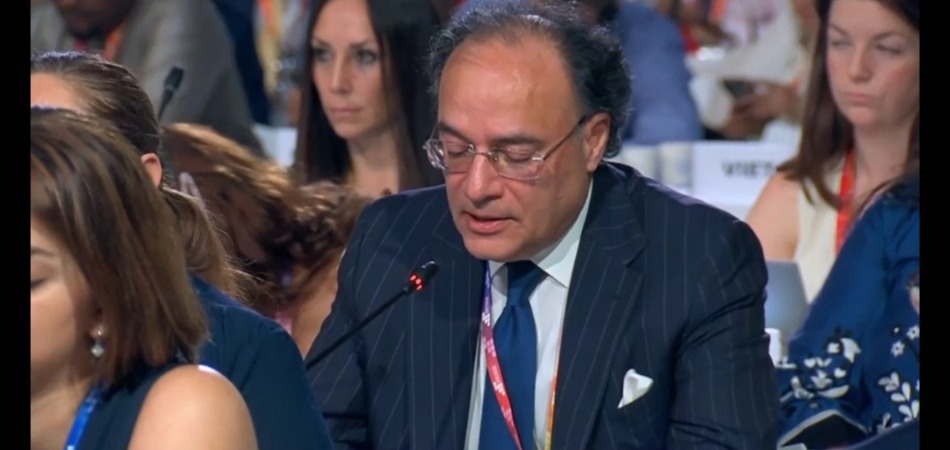PBC 100-day agenda stresses the importance of long-term policies

By MG News | July 11, 2018 at 12:18 PM GMT+05:00
Pakistan Business Council (PBC), a business policy advocacy platform representation 70 companies from across all sectors yesterday released it’s 100-day economic plan for whichever party comes to power in the coming General Elections.
The PBC document provides a course of action while taking stock of problems in economy and suggests a long-term approach to deal with these challenges.
PBC report highlights key challenges faced by economy on a macro and micro level. The PBC Agenda emphasizes need to ensure sustainable development for long-term at a fundamental level, it suggests concrete steps for development of core nation-building sectors such as education, skills, health care, water, sewage and waste disposal. The Council’s agenda has released a list of priorities for the coming government which includes initiatives to support labor, provision of energy at competitive rates, level playing field for businesses, revision of international and bilateral trade agreements, realistic exchange rate adjustment, tariff promotion to change import composition, increasing tax base and tax revenues, increasing FDI with attractive investment policies and dealing with climate change and environment.
The agenda prioritizes “well aligned government policies that support business and ensure a fair return to labor”. PBC advises the incoming government to balance short term revenue considerations with long-term benefits of an export intense economy.
The document also suggests a state sponsored housing scheme which can create a multiplier effect in steel, cement, glass etc. industries and generate employment opportunities as well. It mentions the rising energy prices turning local production uncompetitive with regional players such as India, Bangladesh etc.
Furthermore, highlighting the issues of undocumented, illegal economy running parallel to the formal economy, the report says that this is hindering the growth of businesses who are conducting their operations with fairness. The report advises a level playing field by clamping down on the smuggled and counterfeit goods which are flocking the markets unchecked.
Regarding trade agreements and partnerships, the paper advises coming government to avoid the mistakes of past and carry out smart bilateral, regional and international trade agreements. The PBC advises a revision of Free Trade Agreement with China to pacify concerns of local businesses, and curb the widening trade deficit with the Asian dragon. It advises abandoning agreements with Turkey and Thailand altogether which are costing jobs in the local economy.
The PBC emphasizes on promotion of tariffs mechanism to avoid unnecessary imports of goods and services which can be produced locally.
Pakistan’s businesses are perennially exposed to currency risks, the government’s interventional role in the currency has historically wreaked havoc as a result of any change in the exchange rates. The document advises a gradual adjustment in exchange rate rather than a sharp and abrupt change which shocks the entire market. Exchange rate models to promote trade as employed by other Asian exporters such as China, Japan and South Korea can be used as a vantage point for exchange rate strategy.
On taxation, the report highlights the unjust taxation of manufacturing sector relative to other sectors which are not under the tax net such as agriculture, wholesale, retail, and services contributing most to the national Gross Domestic Product ‘GDP’. A tax database is also suggested to ensure timely collection of taxes and identify tax evaders promptly.
Pakistan must “focus on export and technology oriented foreign direct investment.” The report suggests FDI targets in the sectors such as agriculture, exports, infrastructure and technology.
The report also highlights the potential in dairy, livestock and agriculture sector and sternly advises tapping the potential of these sectors. It advises employment of research and technology in development of seeds, water usage and ensuring superior export quality to compete in international markets. Regarding mismanagement of water resources, the report says that Pakistan has a canal efficiency of 33 percent compared to global average of 90 percent, it is incumbent upon the incoming government to take appropriate actions to tackle this momentous loss of resources.
The report also highlights the mismanagement of state owned enterprises (SOEs) taking their toll on the national revenues and suggest the incoming party to address it at a war footing. Revival and privatisation of government entities is also encouraged to ensure smooth operations at these SOEs.
Lastly, the report advises coming government to ensure absolute transparency of costs, benefits, and financial flows associated with the China Pakistan Economic Corridor (CPEC). The report suggests a mechanism for Special Economic Zones (SEZ) which is conducive to existing businesses and also suggests effective and efficient administration for timely completion of these crucial projects.
The party which wins the mandate on 25th July, must take into considerations the suggestions by Pakistan Business Council and other bodies which represent the interest of business community.
Related News
| Name | Price/Vol | %Chg/NChg |
|---|---|---|
| KSE100 | 130,344.03 345.59M |
1.67% 2144.61 |
| ALLSHR | 81,023.99 1,021.16M |
1.55% 1236.37 |
| KSE30 | 39,908.26 141.49M |
2.05% 803.27 |
| KMI30 | 189,535.00 150.14M |
1.40% 2619.39 |
| KMIALLSHR | 54,783.66 508.40M |
1.07% 581.78 |
| BKTi | 34,940.73 55.85M |
4.37% 1464.05 |
| OGTi | 28,296.06 15.94M |
1.19% 333.47 |
| Symbol | Bid/Ask | High/Low |
|---|
| Name | Last | High/Low | Chg/%Chg |
|---|---|---|---|
| BITCOIN FUTURES | 108,350.00 | 108,350.00 105,440.00 |
2600.00 2.46% |
| BRENT CRUDE | 67.75 | 67.77 66.94 |
0.64 0.95% |
| RICHARDS BAY COAL MONTHLY | 97.50 | 0.00 0.00 |
0.75 0.78% |
| ROTTERDAM COAL MONTHLY | 103.80 | 0.00 0.00 |
-3.70 -3.44% |
| USD RBD PALM OLEIN | 998.50 | 998.50 998.50 |
0.00 0.00% |
| CRUDE OIL - WTI | 66.07 | 66.08 65.23 |
0.62 0.95% |
| SUGAR #11 WORLD | 15.83 | 15.97 15.77 |
0.13 0.83% |
Chart of the Day
Latest News
Top 5 things to watch in this week
Pakistan Stock Movers
| Name | Last | Chg/%Chg |
|---|
| Name | Last | Chg/%Chg |
|---|




 CPI
CPI